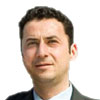Nerve-stimulation treatment effective against drug-resistant epilepsy
Medications are the mainstay of treatment for epilepsy, but for a considerable number of patients – estimated to be as many as 1 million in the US – drugs don’t work. These patients suffer from a type of epilepsy known as refractory or drug-resistant epilepsy, in which drugs can’t control their seizures.
But at an epilepsy conference, Dr Christopher DeGiorgio, a UCLA professor of neurology, presented the results of a non-invasive, non-pharmaceutical treatment that shows promise in controlling seizures.
In his talk at the Antiepileptic Drug Trials XI Conference in Miami, Fla., DeGiorgio reported the results of a Phase 2 clinical trial of a new treatment called trigeminal nerve stimulation (TNS). He noted that 40 per cent of the patients receiving TNS treatment experienced a significant improvement in seizure reduction.
The external stimulator, which is about the size of a large cell phone, attaches to a belt or can slip into a pocket. Wires from the stimulator are passed under the clothing and connected to conductive pads attached to the forehead. The electrodes, which can be covered by a cap or scarf, transmit a signal to the trigeminal nerve, which extends into the brain from the face and forehead and is known to play a role in seizure inhibition.
“TNS offers potential benefits – it can be delivered bilaterally (to both sides of the brain) and at high frequencies,” DeGiorgio said. “Since the electrical energy does not travel directly into the brain, TNS provides a safe method of brain modulation.”
The clinical trial showed that at the end of the 18-week study, 40 per cent of patients receiving TNS experienced a significant improvement in seizure reduction, which is defined as a 50 per cent or greater decrease in the frequency of seizures.
“We showed that TNS works well, under stringent clinical-trial conditions. The fact that 40 per cent showed a clinically-meaningful response is exciting,” DeGiorgio said.
These results confirm and extend the findings of DeGiorgio’s positive Phase 1 trial in epilepsy, reported in 2009 in the journal Neurology.
In addition, the researchers found that the TNS treatment also improved the mood of the participants. Since depression is a common problem in people with epilepsy, this finding could have significant impact on the quality of life of people who suffer from the disorder.
DeGiorgio, lead inventor of TNS, was the principal investigator for the Phase 2 study, which was conducted at Olive View–UCLA Medical Center and the University of Southern California.
“I’m encouraged to see that our non-invasive and safe approach to neuromodulation compares favorably to pharmaceutical and surgically implanted device therapies of drug-resistant epilepsy,” he said.
The research was funded by the Epilepsy Therapy Project; the Epilepsy Foundation; Boston Scientific; and the Milken Family Foundation. UCLA’s Office of Intellectual Property executed an exclusive worldwide license for TNS with NeuroSigma, Inc., a Los Angeles–based medical technology company. DeGiorgio is a consultant with NeuroSigma but has no equity interest in the company.
(Source: University of California, Los Angeles: Antiepileptic Drug Trials XI Conference, Miami)
More information
 | For more information on epilepsy and its treatments, and some useful animations and videos, see Epilepsy. |
Dates
Tags
Created by:

 Login
Login














